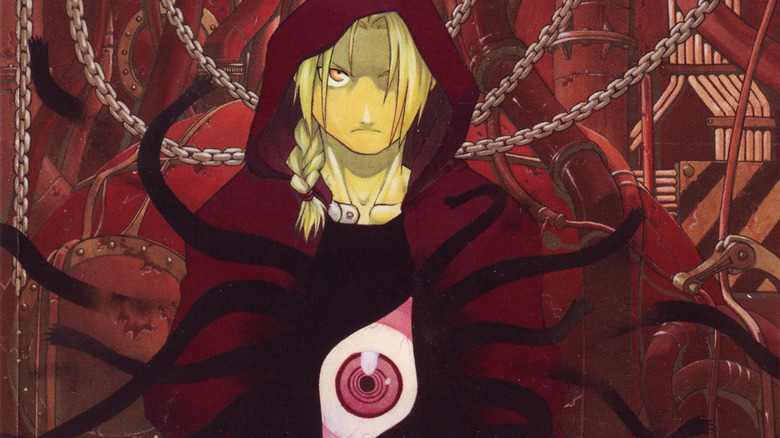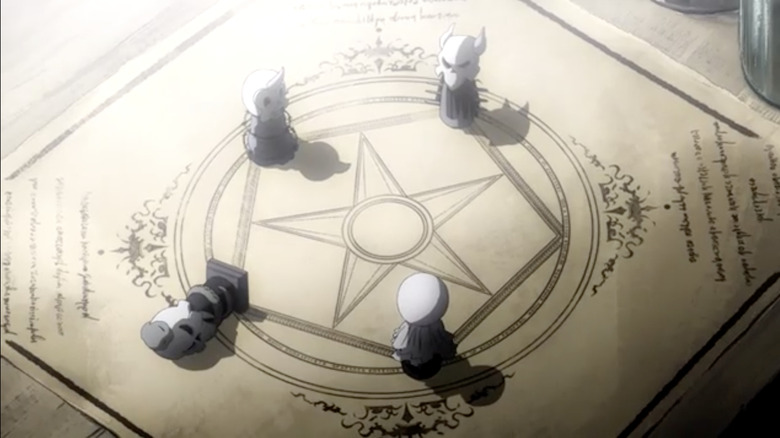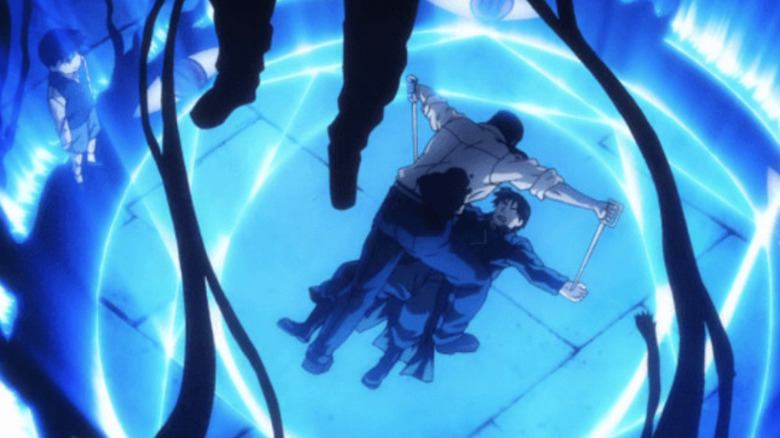A Major Part Of Fullmetal Alchemist Had Its Meaning Lost In Translation
My preferred way to watch "Fullmetal Alchemist" is the English dub. Scripted and recorded by Funimation, both iterations of the classic anime series feature some of the best dubbing around, just behind "Cowboy Bebop." All the voice actors fit their characters like a glove and their performances burn with passion.
However, even the best anime dubs can only offer an approximation of the original. Translate too literally, and you'll end up with poorly phrased, dramatically inert dialogue. Often, subtext and connotation can fall by the wayside in the process. "Fullmetal Alchemist: Brotherhood" was not immune — an important plot point involving "human sacrifices" had a specific, Japanese-centric root that was lost in English.
Human sacrifices
On the surface, "Fullmetal Alchemist" is one of the least Japanese shōnen anime/manga. The story is set in the fictional country Amestris, a hodgepodge of Western European nations: in particular, Germany, England, and France. Most of the main characters are coded as white with European names (Edward and Alphonse Elric, Roy Mustang, etc.).
Much of the show's mythology about alchemy comes from the West too — the MacGuffin of "Fullmetal Alchemist," the Philosopher's Stone, is a myth associated with Frenchman Nicolas Flamel. While Christianity isn't practiced in Amestris, the villainous Homunculi are named for the Seven Deadly Sins. That said, it'd be hard for a series written by a Japanese woman (Hiromu Arakawa) to draw zero influence from Japanese culture. One such influence is the Homunculi's plan.
Throughout the series, the Homunculi call the Elric brothers their "human sacrifices" — this is why they don't kill the pair even though the brothers keep interfering with their plans. Why the Elrics qualify as "sacrifices" and what the Homunculi need them for isn't immediately clear, but the villains keep searching for more candidates: the Elrics' father Hohenheim, their alchemy teacher Izumi Curtis, and Colonel Mustang.
It's eventually revealed that what makes someone a candidate for human sacrifice is that they've seen beyond the Gate of Truth, the metaphysical source of all knowledge. To see this, one must be a powerful alchemist who has attempted to (re)create life via human transmutation. The Elrics, Izumi, and Hohenheim all fit; near the end of the story, the Homunculi Pride and Wrath force Mustang through the Gate to create the fifth sacrifice.
Hitobashira
The Homunculi need these sacrifices because their Father wants to open the Gate of Truth himself. During a solar eclipse on "The Promised Day," he plans to use the sacrifices as catalysts, drawing energy from their personal Gates of Truth. He will in turn use that energy to transmute all the souls of Amestris into a Philosopher's Stone. By combining that power with the celestial synchronicity of the eclipse, he will then open the Gates of Heaven and Earth and absorb God into himself.
Within the series' mythology, this plan makes sense. However, it turns the "sacrifice" label into a misnomer; the five are the only humans in Amestris whose lives aren't sacrificed in the transmutation. Indeed, after Father absorbs God, the sacrifices awaken exhausted but alive. So, why the label "sacrifice"?
In the original Japanese, the Homunculi refer to the sacrifices as "Hitobashira." Furthermore, "Brotherhood" episode 58, titled "Sacrifices" in English, is called "Hitobashira" in Japanese. This was a ritualistic practice in East Asia of antiquity, Japan included. Essentially, people would be buried alive inside pillars and buildings under construction. The most literal English translation possible is "human pillar." The five being called "human pillars" instead of sacrifices does make more sense; their purpose is to support Father's transmutation, essentially making them the pillars of the reaction.
It'd be overstating it to call "human sacrifice" an outright translation error, and it certainly sounds more ominous than "human pillar." However, this does illustrate how even seemingly faithful translations can't always capture the subtleties and nuances of the original text.


